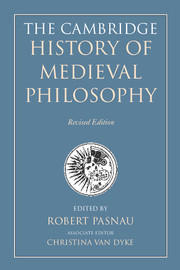Book contents
- Frontmatter
- Contents of Volume 1
- Preface
- List of contributors
- Frontmatter
- Contents of Volume 2
- Introduction
- I Fundamentals
- II Logic and language
- III Natural philosophy
- IV Soul and knowledge
- V Will and desire
- VI Ethics
- VII Political philosophy
- VIII Metaphysics
- IX Theology
- Appendices
- Bibliography of primary sources
- Bibliography of secondary sources
- Index nominum
- Index rerum
Introduction
Published online by Cambridge University Press: 05 August 2014
- Frontmatter
- Contents of Volume 1
- Preface
- List of contributors
- Frontmatter
- Contents of Volume 2
- Introduction
- I Fundamentals
- II Logic and language
- III Natural philosophy
- IV Soul and knowledge
- V Will and desire
- VI Ethics
- VII Political philosophy
- VIII Metaphysics
- IX Theology
- Appendices
- Bibliography of primary sources
- Bibliography of secondary sources
- Index nominum
- Index rerum
Summary
Medieval philosophy emerges after the decline of ancient Greece and Rome, when new cultures begin to produce works of philosophy that are at once inspired by that ancient legacy and yet responsive to new cultural and religious circumstances. There is now some consensus on when and where to place the beginnings of medieval philosophy, understood as a project of independent philosophical inquiry: it begins in Baghdad, in the middle of the eighth century, and in France, in the itinerant court of Charlemagne, in the last quarter of the eighth century. It is less easy to say when medieval philosophy ends, because the methods and doctrines that are characteristic of the medieval period endure, and indeed remain dominant, into what is conventionally called the Renaissance. It is not until the seventeenth century, in Europe, that an indisputably new kind of philosophy becomes dominant.
The present volumes give an overview of the people and ideas that shape philosophy through these Middle Ages, from the eighth through the fourteenth century and beyond. One of the most compelling and challenging features of this era is its global reach. Whereas the study of ancient and modern philosophy confines itself mainly to work done within a homogeneous cultural sphere of at most a few hundred miles, the world of medieval philosophy runs from Oxford to Nishapur and from Fez to Prague, through Islamic, Jewish, and Christian thought, and correspondingly through Arabic, Hebrew, Latin, and Greek texts (to mention only the most prominent languages). It is the ambition of these volumes to provide a broad, integrated account of this material.
- Type
- Chapter
- Information
- The Cambridge History of Medieval Philosophy , pp. 1 - 8Publisher: Cambridge University PressPrint publication year: 2014



